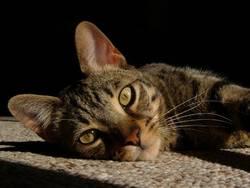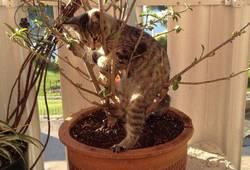
Myth 1: You can tell if a cat is sick based on whether its nose is dry.
False: There is no correlation between the moisture of your pet’s nose and whether it is ill. That being said, a cat that is sick may not groom itself and keep its nose clean. Nasal discharge can be a sign of sickness.
Myth 2: Cats need to drink milk.
False: Although cats may enjoy drinking cow’s milk, it is not a balanced source of nutrients for them. Nursing kittens will not thrive on other species’ milk and they require cat milk replacer if they need to be bottle-fed. Adult cats may enjoy a bit of milk as a treat but it might cause an upset stomach for some, in which case it is best avoided.
Myth 3: Cats that are well-fed don’t hunt.
False: All kitten and cats (even those that have never lived outside) have a strong drive to stalk, chase and pounce and bite small fast moving objects. Unfortunately, even when a bell is placed on the collar of a cat that goes outside, birds do not recognize the sound of the bell as a threat. Consider keeping your cat indoors to prevent it from killing small mammals, amphibians and birds. Indoor cats love being able to watch birds and squirrels through a window for entertainment.
Myth 4: Cats are like small dogs (and can have the same food and medication as dogs).
False: Unlike humans and dogs, cats must have animal protein and cannot survive on a vegetarian diet. Cats are strict carnivores and require amino acids such as arginine and taurine, which are best supplied from meat. In addition, cats have a different ability to metabolize drugs from other species. Tylenol is fatal to cats at very low doses because they lack the enzyme needed to metabolize it. Likewise, a topical flea product for dogs can be poisonous if applied to a cat.
Myth 5: Cats purr when they are content.
False: Cats purr for a variety of reasons. It is a communication tool often used to convey friendship – for example, kittens will purr while they are nursing, as will the mother cat. However, cats may also purr while giving birth or when injured – times when they are stressed and looking for friendship.
Cats have evolved as both a prey and predator species and are unique in many ways. It is precisely this uniqueness that makes them delightful companions. Mitchell Veterinary Services celebrates feline friends and is dedicated to accommodating their specific needs.

